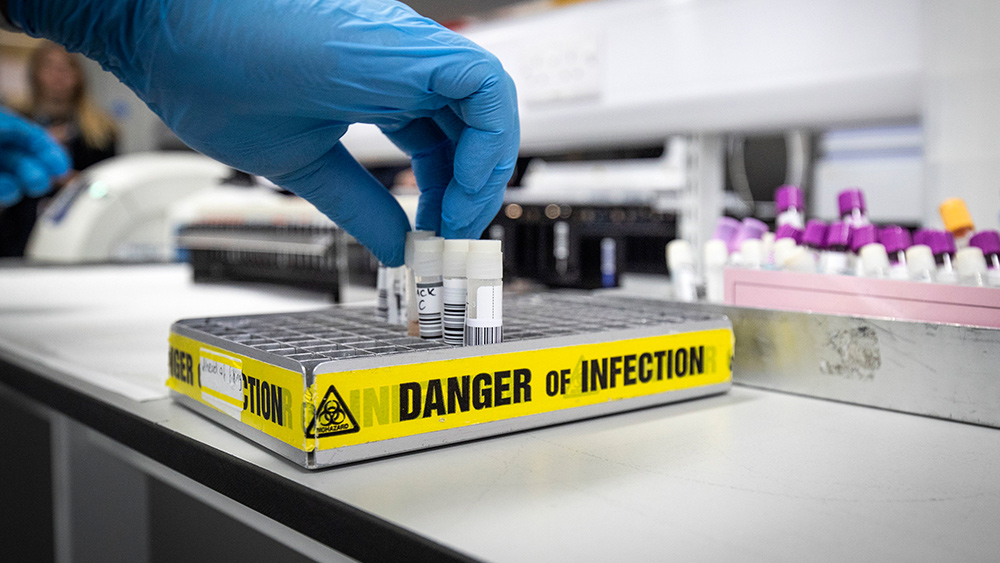Study links autoimmune diseases to nearly doubled risk of depression and anxiety
07/02/2025 / By Cassie B.

- Autoimmune disease patients face nearly double the risk of depression, anxiety, and bipolar disorder compared to the general population.
- Women with autoimmune conditions suffer higher mental health impacts, linked to inflammation, hormones, and genetics.
- Chronic inflammation, not just “chemical imbalance,” drives mental health struggles, yet conventional treatments ignore this connection.
- Anti-inflammatory diets, gut healing, and stress reduction offer proven solutions but are overlooked in favor of medications.
- Experts demand urgent mental health screenings for autoimmune patients and holistic, root-cause approaches to treatment.
A groundbreaking study of 1.5 million people has exposed a hidden crisis: those suffering from autoimmune diseases like rheumatoid arthritis, lupus, and inflammatory bowel disease are nearly twice as likely to develop depression, anxiety, or bipolar disorder compared to the general population.
Published in BMJ Mental Health, the research reveals that 28.8% of autoimmune patients battle mental health disorders, far exceeding the 17.9% rate among healthy individuals. Women bear the heaviest burden, with 31.6% being affected.
This disturbing connection underscores what holistic health advocates have warned for years: chronic inflammation doesn’t just ravage the body; it hijacks the mind. Yet conventional medicine continues to overlook this critical link, leaving millions undiagnosed and untreated. As Big Pharma profits from Band-Aid solutions, vulnerable patients deserve the truth: mental health and immune function are inseparable.
The silent epidemic doctors ignore
The study, drawing from the UK’s Our Future Health dataset, delivers shocking figures:
- Depression afflicted 25.5% of autoimmune patients vs. 15.2% of the general population.
- Anxiety plagued 21.2% compared to 12.5%.
- Current depressive symptoms were nearly double (18.6% vs. 10.5%).
Even after adjusting for age, income, and family history, autoimmune sufferers faced 48% higher odds of mental health struggles. Lead researcher Dr. Arish Mudra Rakshasa-Loots confirmed these patients need urgent mental health screenings, yet most doctors still aren’t looking.
Dr. Christina Steyn, a study coauthor, noted: “Although the observational design of this study does not allow for direct inference of causal mechanisms, this analysis suggests that chronic exposure to systemic inflammation may be linked to a greater risk for affective disorders.”
Why women suffer the most
The gender gap is glaring: autoimmune conditions strike women disproportionately (75% of cases), and their mental health suffers more severely. Researchers theorize that hormonal differences, immune responses, and genetic factors compound the damage. Women with depression already show elevated inflammatory markers, which means their bodies and minds are under dual assault.
This study shreds the myth that mental health exists in a vacuum. Depression isn’t just a “chemical imbalance”; it’s often inflammation’s brutal collateral damage. Yet instead of addressing root causes, the medical establishment pushes antidepressants and immunosuppressants, trapping patients in a cycle of dependency.
Prescription joint health products raked in $8 billion in 2001, yet chronic illness rates keep climbing. Meanwhile, natural solutions such as anti-inflammatory diets, stress reduction, and microbiome support are being sidelined despite their proven efficacy.
A roadmap to healing
The study’s implications are clear. First, nutrition matters. Omega-3s, polyphenol-rich foods such as berries and turmeric, and leafy greens combat the inflammation fueling mental decline.
In addition, gut health is vital. Probiotics and fermented foods restore the microbiome balance critical for immunity and neurotransmitter production.
It’s also important to keep in mind that stress kills. Meditation and sleep repair the inflammatory damage that worsens autoimmune and psychiatric symptoms.
With 20 million Americans suffering from arthritis alone and millions more battling invisible inflammation, this research demands a revolution in care. Screening autoimmune patients for mental health issues must become standard. More critically, patients deserve access to holistic, root-cause treatments and not just symptom management.
As healthcare costs spiral and chronic illness devastates lives, it is getting harder to deny that the body and mind are one system. Healing requires treating both.
Sources for this article include:
Submit a correction >>
Tagged Under:
Anxiety, Autoimmune disorders, beat depression, depression, mental, mental health, mind body science
This article may contain statements that reflect the opinion of the author




















